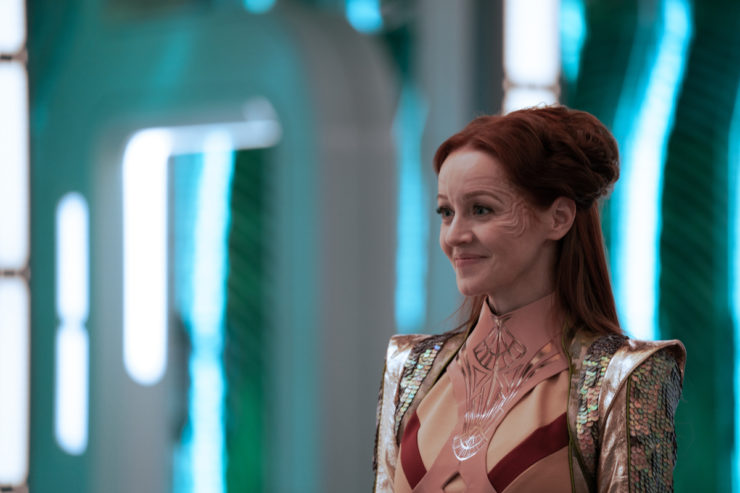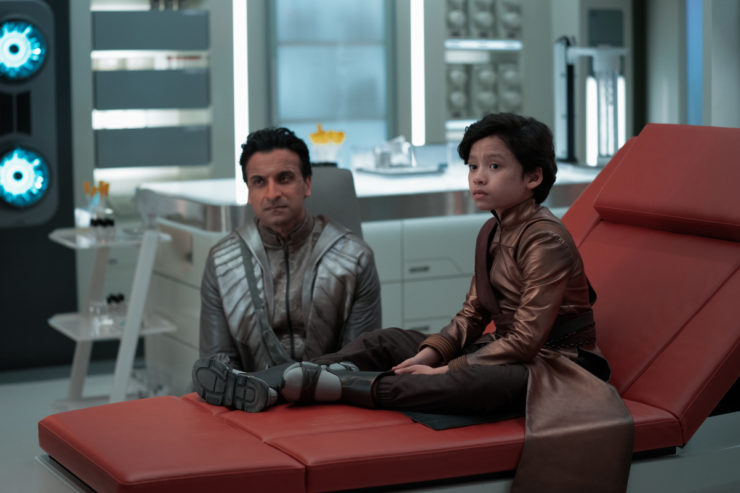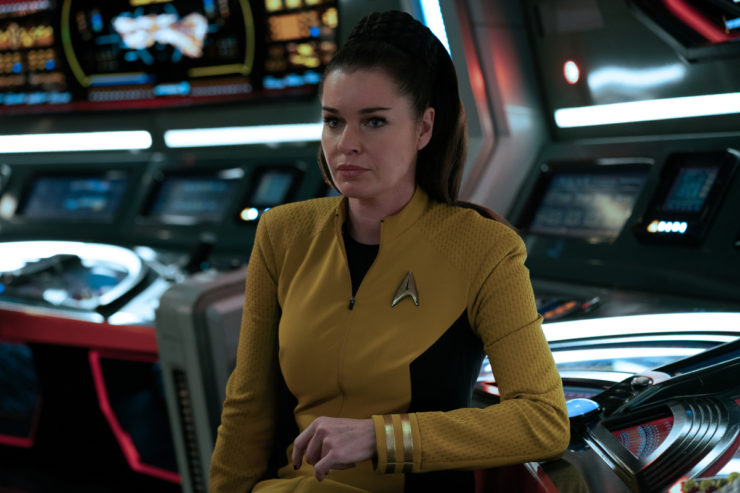An old Trek standby is revisiting an old adventure from one (or more) character’s earlier career prior to the timeframe of the show. It’s not a major trope or anything, but we’ve seen it in the original series (“Friday’s Child,” “Obsession”), TNG (“Identity Crisis,” “The Pegasus”), DS9 (“Necessary Evil”), and Voyager (“Flashback”), among others—for that matter, probably the biggest example of it is the episode that introduced Christopher Pike to the audience, “The Menagerie” on the original series.
And SNW does it this week, as Pike revisits a planet he first visited when he was a lieutenant.
Another old Trek standby is the romantic entanglement from the captain’s past, particularly on the original series (“Court Martial,” “Shore Leave,” “The Deadly Years,” The Wrath of Khan), though TNG indulged in it as well (“We’ll Always Have Paris,” “Qpid”). Here, we get Pike being reunited with Alora of the planet Majalis. He rescued her from a damaged shuttle when he was a lieutenant, and here he gets to do it again. Number One comments that Alora has bad luck with shuttles, and Alora, without even looking at her, as she’s still too busy staring at Pike, says, “Or good luck.”
Alora is played by Lindy Booth—among other things, Rebecca Romijn’s co-star on The Librarians—and she fulfills the cardinal rule of one-episode romance-with-a-guest-star episodes. Episodes like this live or die on whether or not the guest actor has chemistry with the person they’re paired up with. In the transporter room when the pair are reunited, you could put a match between the pair of them as they’re facing each other and it would light on its own from the sparks the pair generate.
The casting helps, as Booth is never not delightful, and Mount has the ability to have chemistry with pretty much anyone he’s in a scene with.
However, while the romance angle here works decently enough, the actual story is—well, fine? I guess? I mean, there’s nothing actively wrong with it, but I can’t bring myself to be too excited about it, either.

It’s a story we’ve seen before, most notably in Ursula K. Le Guin’s 1973 short story “The Ones Who Walk Away from Omelas,” and that makes the twist ending a little too predictable, which is mostly an issue because it’s a case where the viewer sees it coming because it’s a trope, and you wonder what’s taking the characters so damn long to figure it out. Though in this case—much like the original series’ “Obsession,” not to mention TNG’s “We’ll Always Have Paris”—the emotional baggage blinds the captain to things he might notice otherwise.
Alora was taking the First Servant back to Majala. The First Servant is a boy chosen by lottery to embody the Majalan credo of Science, Service, and Sacrifice. That last word is particularly important, because over the course of the episode it becomes clear that the child is being groomed to plug himself into a machine that sustains Majala that will kill him before too long.
The reason why the machine requires the neural network of a child to function has been lost to antiquity, and the Majalans are trying to find a new way to make the thing work, but have thus far failed. In fact, when Alora and Pike first met, she was doing research into that very thing.
Prior to the climactic reveal, I kept thinking that the First Servant’s “ascension” was going to be something horrible. Again, a big part of this is the recognition of the trope—this is a story we’ve been seeing on genre television since The Twilight Zone, where the nifty-sounding thing turns out to be a really really awful thing—but I also twigged to it the moment Alora said the word “sacrifice.” It’s hard to imagine a sacrifice that has to be made by a child that can be in any way good.
There’s a faction of Majalans who agree, as the shuttle was attacked by a group who thinks plugging a kid into a machine that will kill that kid inside a few years is a bad thing. (When the First Servant “ascends,” they remove the desiccated corpse of another child.) It turns out that the boy’s biological father, Elder Gamal, who was on the shuttle with Alora and the First Servant, is part of that rebellion, and was trying to get his son to safety, until the Enterprise interfered. It was a well-meaning interference—they were answering a distress call from the shuttle, and it was a big-ass ship picking on a small-ass ship.

Ian Ho does excellent work as the First Servant, as he comes across as brilliant and precocious without being cutesy. In particular, I love his brief interactions with M’Benga’s daughter Rukiya during one of her periodic rematerializations. (Later, Gamal provides M’Benga with some medical knowledge that might help him find a cure.)
But the best part is when the First Servant is about to “ascend,” and everything’s going great, he’s got a smile on his face, and he’s ready to go—until he sees the dead body being brought out. Ho’s face is filled with fear from this point on, and the moment that the tendrils of the machine plug into his face and he screams is as nasty a horror-movie moment as you’ll ever see on a Trek show, and it’s devastating.
Buy the Book


The City Inside
Again, the episode is fine, but I find myself frustrated with many aspects of it. Pike’s outrage once he realizes the truth is very well-played, and there’s little he can do about it, much as he would like otherwise. Mount plays it all beautifully; as usual, every emotion is etched on his pores, and he so magnificently sells Pike’s attraction to Alora, his confusion when he realizes what’s really going on, and his sad anger once everything comes to light.
I’m of two minds about the final scene. I was hoping for a conversation between Pike and Number One about what happened, as that’s what first officers are for—and Number One has been almost criminally underused thus far—but the image of him just standing there with a drink in his hand staring sadly out the window in his quarters was damned effective.
This episode also continues the getting-very-repetitive theme of Uhura’s cadet rotation coinciding with that week’s plot—away-team duty in “Children of the Comet,” engineering in “Memento Mori,” security this week. Just as with “Comet,” by a startling coinky-dink the cadet’s current assignment is a part of the ship that requires linguistic skills. In this case, it’s to translate some data chips that La’An took from the crash site of the vessel that fired on the First Servant. Because she took them illegally, she can’t run them through the translator, so she hands them to Uhura, who’s on security rotation and has to do whatever La’An says. This proves useful, as the information on the chips reveals that the attack wasn’t kidnappers looking to ransom the First Servant, as Alora proposed, but rebels who don’t want to destroy a child’s life.
Many of the comments online about this show that are favorable have all been along the lines of how there hasn’t been a dud episode yet, and I think that streak ends here. There are individual parts of the episode that are quite good, but the whole is far less than the sum of its parts.
Keith R.A. DeCandido urges everyone to support the Kickstarter for Phenomenons: Season of Darkness, the second volume in the shared-world superhero anthology series published by Crazy 8 Press. The anthology features stories by Keith and fellow Trek prose stylists Michael Jan Friedman (who also created and is the editor of the series), Peter David, Geoffrey Thorne, Ilsa J. Bick, Robert Greenberger, Paul Kupperberg, Aaron Rosenberg, and Glenn Hauman, as well as screenwriter Dan Hernandez and novelists Mary Fan, Michael A. Burstein, Marie Vibbert, Russ Colchamiro, Hildy Silverman, and Alex Segura. Please consider supporting the anthology on Kickstarter!










